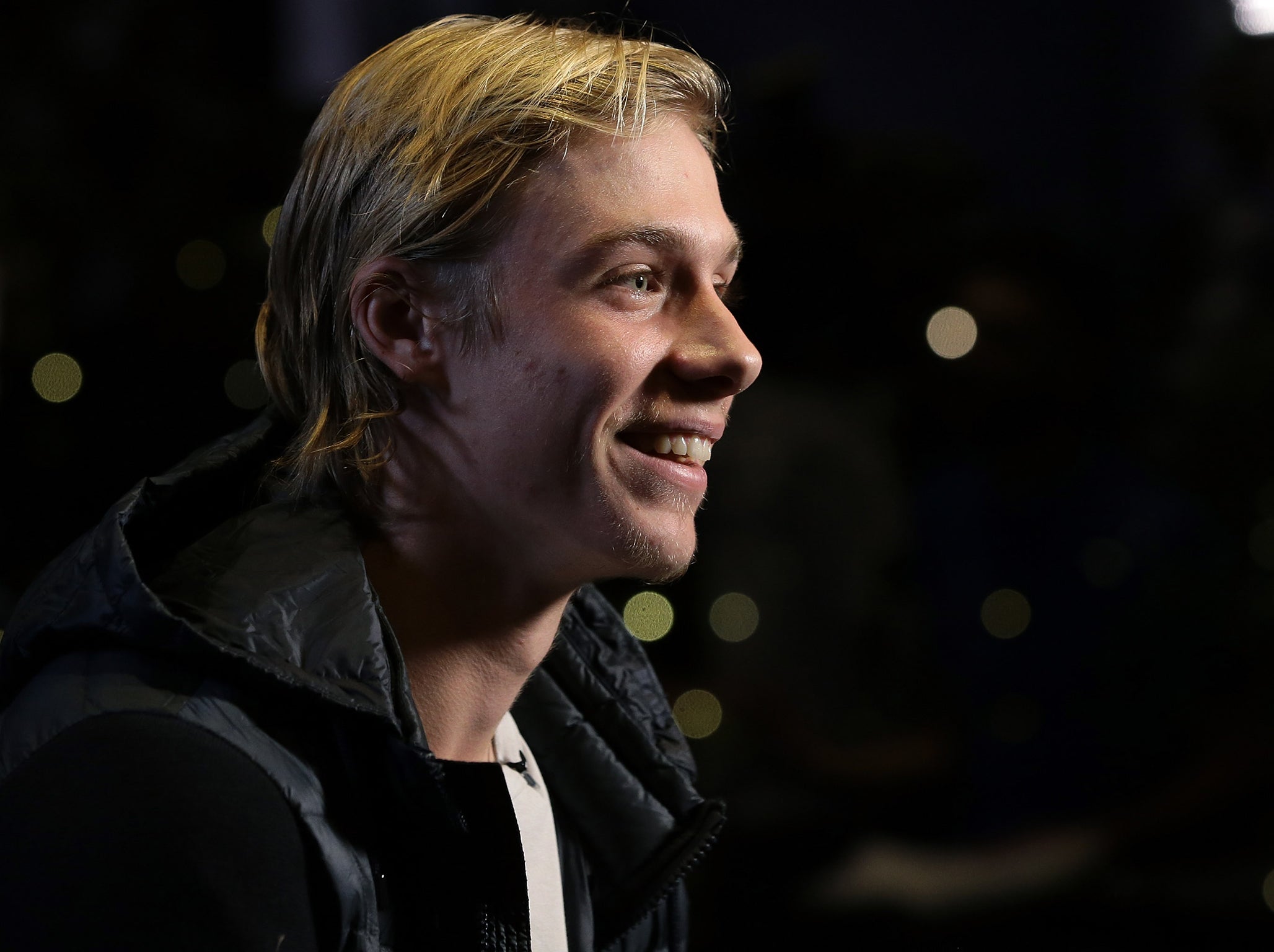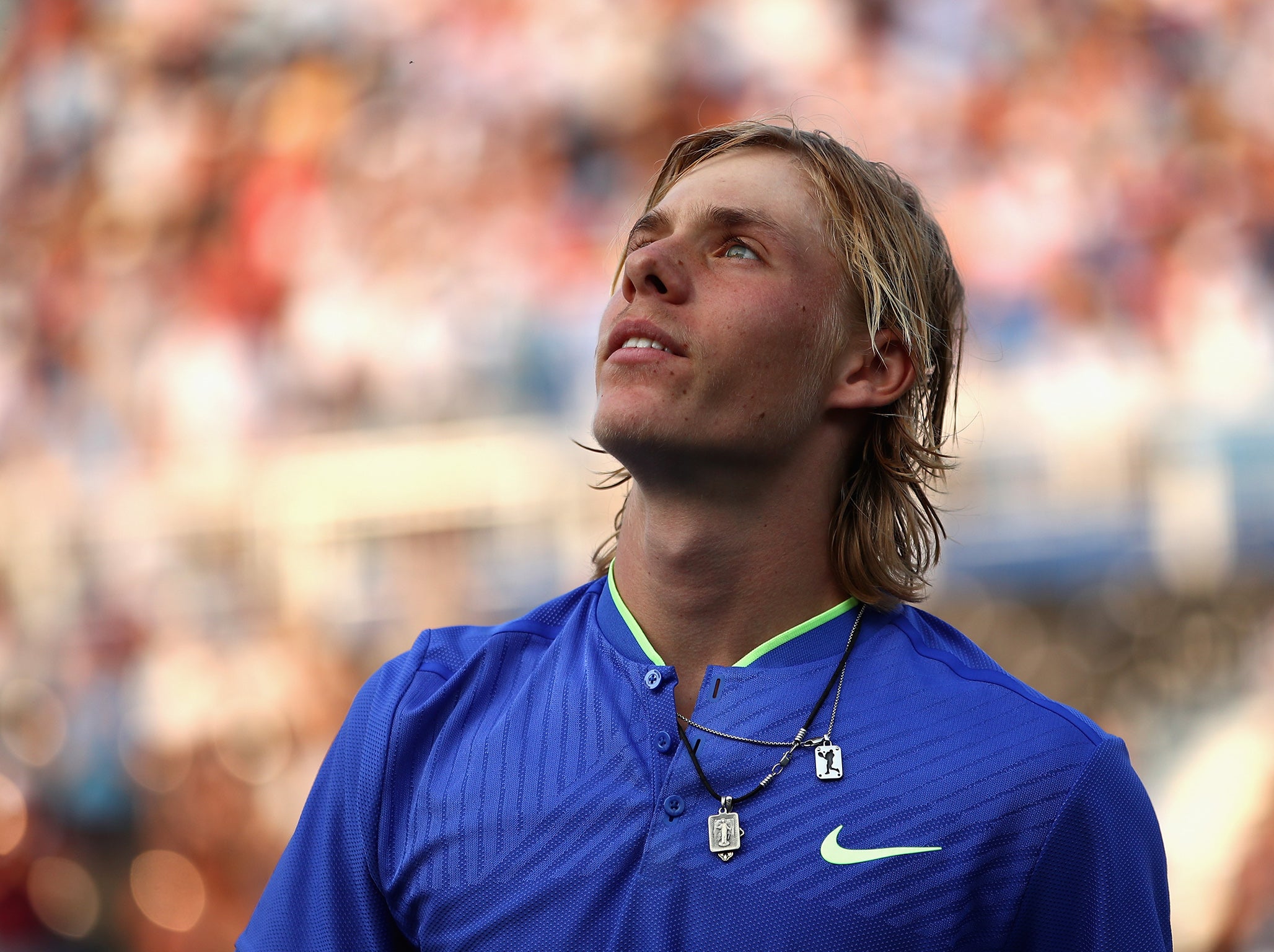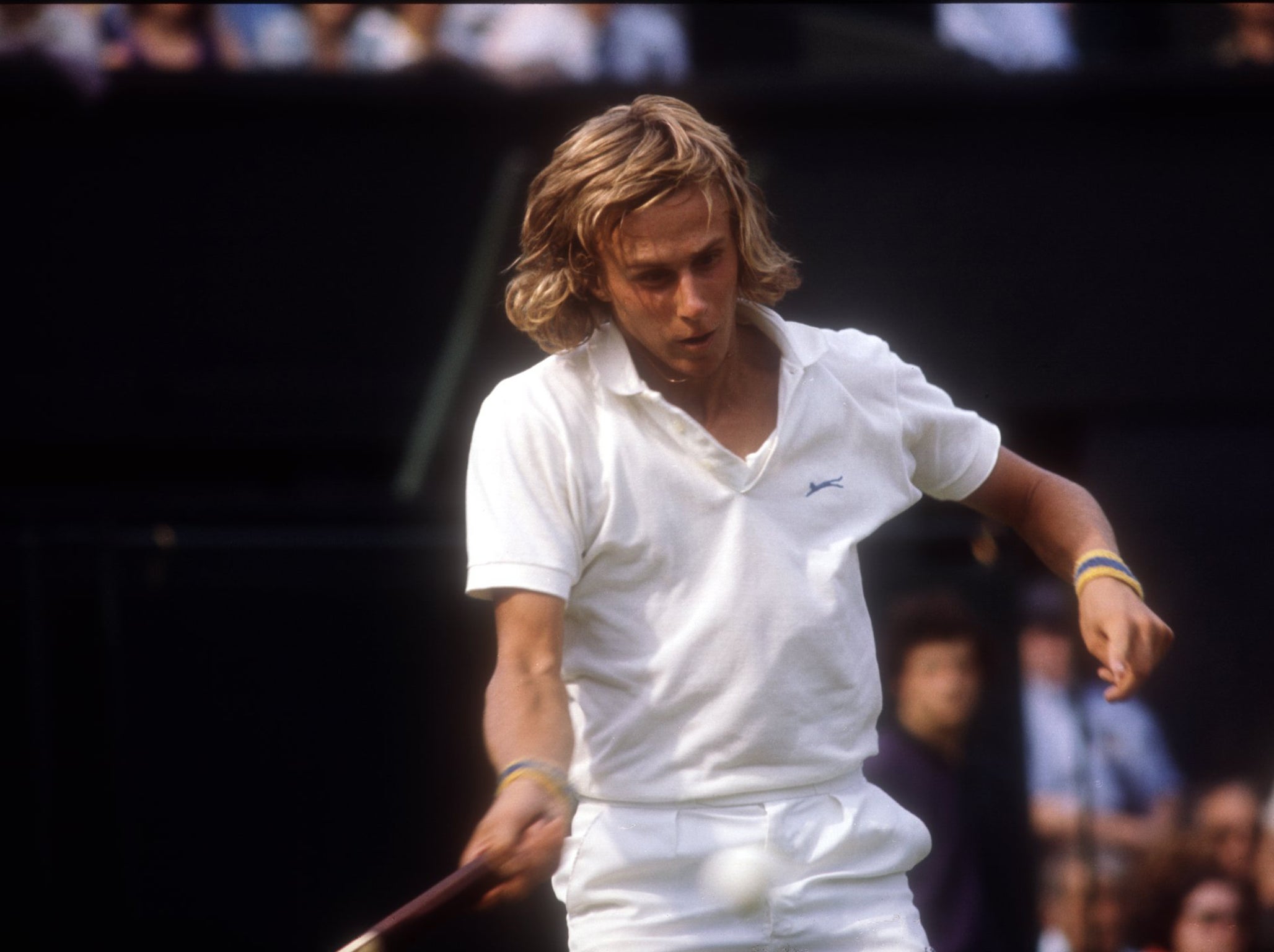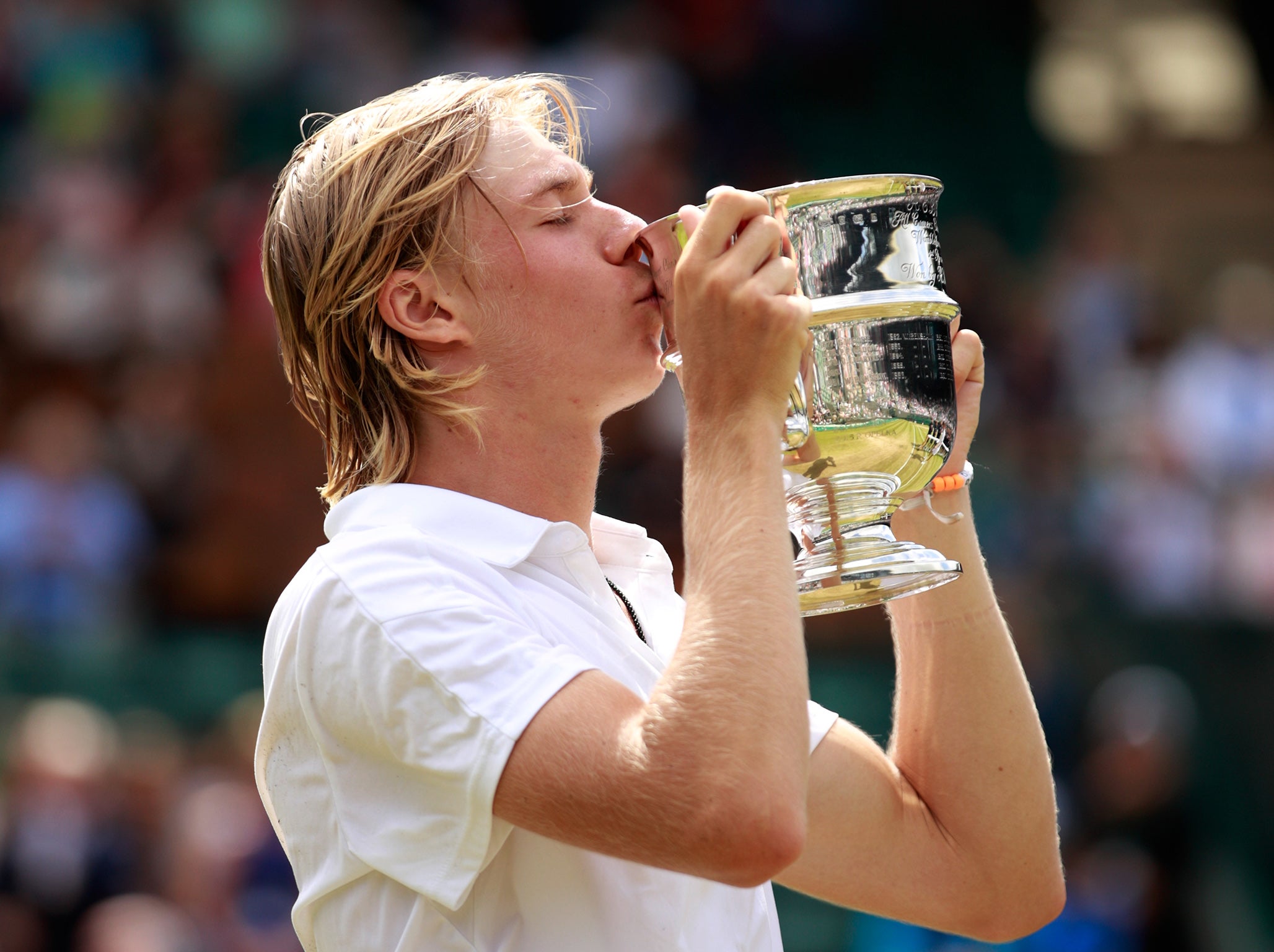Wimbledon 2018: Rising star Denis Shapovalov reflects on the prizes and pitfalls of his newfound fame

Your support helps us to tell the story
From reproductive rights to climate change to Big Tech, The Independent is on the ground when the story is developing. Whether it's investigating the financials of Elon Musk's pro-Trump PAC or producing our latest documentary, 'The A Word', which shines a light on the American women fighting for reproductive rights, we know how important it is to parse out the facts from the messaging.
At such a critical moment in US history, we need reporters on the ground. Your donation allows us to keep sending journalists to speak to both sides of the story.
The Independent is trusted by Americans across the entire political spectrum. And unlike many other quality news outlets, we choose not to lock Americans out of our reporting and analysis with paywalls. We believe quality journalism should be available to everyone, paid for by those who can afford it.
Your support makes all the difference.With his long blond hair and flamboyant game, not to mention the hordes of young fans he attracts wherever he plays, Denis Shapovalov could become Wimbledon’s biggest teen sensation since Bjorn Borg.
However, the world No 26 has his feet firmly on the ground - which is where he will need to keep them if everything goes to plan at the All England Club next week. Provided Shapovalov wins his first-round match against Jeremy Chardy and Andy Murray finds a way past Benoit Paire, the 19-year-old Canadian and the 31-year-old Scot will meet in the second round for what would surely be the most eagerly anticipated meeting of the first week.
There is more than a hint of Borg-like maturity in the way that Shapovalov has handled his remarkable rise. Having started last year’s grass-court season as the world No 193 - he even had to qualify to play in the Surbiton Challenger – he has not looked back since.
Last summer Shapovalov became the youngest player ever to reach a Masters Series semi-final after beating Rafael Nadal and Juan Martin del Potro in Toronto, went on to reach the fourth round of the US Open and had the thrill of being picked for the inaugural Laver Cup. The team event gave him the chance to rub shoulders with Nadal and Roger Federer, two of his boyhood heroes.
“Roger and Rafa were dominating when I was growing up, so it’s pretty crazy to see them still dominating at this stage of their careers,” Shapovalov said during a break at this week’s Nature Valley International in Eastbourne.
“They’ve taught me a lot. I’ve always tried to model my game on Roger’s, trying to be aggressive, trying to come in, playing quick, and I’ve always tried to copy Rafa with my fighting spirit. I’ve definitely tried to learn a lot from them – and I keep trying to learn a lot from them.
“On the clay courts I was watching a lot of videos of Rafa, trying to see what he does as a leftie to hurt players. And on the grass I’ve been trying to watch a little bit of Rog, how he plays and why he’s so comfortable and so good on the surface.”
He added: “Getting to know these guys and obviously Roger in particular, it’s pretty crazy for me. They’re not just unbelievable tennis players. They’re really nice people too. They’re really gentleman-like.
“Roger’s always spent time with me. He’s never rushed. He’s always stopped and said hello, spent time talking to me. For a guy like him maybe it’s nothing, but for a player like me it’s huge.”
Had Borg, who was captain of the Europe team at the Laver Cup, given him any tips on how to cope with being a superstar mobbed by young female fans?

“Not yet!” Shapovalov smiled. “Maybe if I had a couple more chats with him he might. Of course there are some similarities, especially with the [hair] I guess, but he’s known to be such a gentleman and such a great champion that he’s definitely someone I could learn from as well.”
With his potent forehand, majestic one-handed backhand and all-action game style, not to mention his frequent interaction with the crowd, it is no wonder that the left-hander is a favourite with the fans. John McEnroe, who was captain of Shapovalov’s Rest of the World team at the Laver Cup, sees something of himself in the way the young Canadian plays.
“He brings a lot of excitement,” McEnroe said. “He’s going to be a great player. I think he brings a lot of energy. He’s very quick. He’s not afraid and it’s nice to see him doing so well. Of course when I watch him with the one-handed backhand and the way he plays, it does remind me of myself. And it’s nice to see that fresh face. He’s a good kid. He seems to be doing all the right things.”
Shapovalov, who is currently the youngest player in the world’s top 100, won the Wimbledon boys’ title two years ago and likes playing on grass. He also loves the big occasion.

“Growing up I always wanted to play on the big stages,” he said. “It’s something you dream of doing: playing Centre Court at Wimbledon, playing on these big courts.
“I love coming out in front of the fans. It’s what I’ve dreamed of doing. There’s no reason to be afraid of it. It’s something I look forward to. I feel really lucky. I feel like practically anywhere in the world that I go the fans are supporting me, so I feel really lucky for that.
“I feel like I play my best tennis when there’s a lot of people watching. That’s why I love engaging with the fans as well. At the end of the day it’s a show. We make money because they come to watch us, so I try to get them into the matches and get them going sometimes.”
Shapovalov, who was born in Israel to Russian parents but moved to Toronto with his family when he was nine months old, admitted that there had been times last year when he found his sudden fame “overwhelming” but said he had soon started to enjoy it.

“I’ve come up quickly, but it feels normal now for me to be competing with these guys,” he said. “I feel like my level’s at this stage.”
Has he experienced “second season syndrome” this year as his ability is no longer a surprise to opponents?
“Especially at the beginning of the year I found that a little bit,” he said. “Players obviously start getting to know you and to know your game. I’ve had to start to work even harder than I did before to try to improve these aspects, keep changing my game up and keep coming up with stuff that’s new that hurts the opponent.
“It’s always like this. It shows you why Roger and Rafa are so good. They keep changing their game. They keep improving and adapting. Players can never get used to their game styles. So that’s something I’ve always tried to do. I think I’ve done a good job of it this year so far. But I’m only 19. I constantly try to stress the fact that a lot of people expect unbelievable results from me every week, but that’s not the way that the game works. I’m going to have some good results but I still have to improve my game to get consistent to have good results every week.”

Shapovalov is similarly level-headed as he looks ahead to Wimbledon. He lost first time out to Jerzy Janowicz on his senior debut at the All England Club last year.
“I would obviously love to go deep, but it’s tough to set any expectations,” he said. “I definitely think I can do some damage, especially on the grass, which really suits my game.
“It’s my second time at Wimbledon as a pro, so it’s not like I’m expecting anything crazy from me. I’m just going to try to take it one match at a time and hopefully I can go far. But if I don’t there will be next year. I’m so young and there are so many chances.”
Join our commenting forum
Join thought-provoking conversations, follow other Independent readers and see their replies
Comments